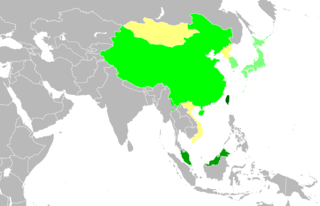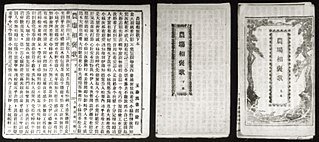| Cinema of Taiwan |
|---|
 |
| List of Taiwanese films |
| Pre-1970 |
| 1970s |
| 1980s |
| 1990s |
| 2000s |
| 2010s |
| 2020s |
This is a list of films produced in Taiwan ordered by year of release. For an alphabetical list of Taiwanese films see Category:Taiwanese films
| Cinema of Taiwan |
|---|
 |
| List of Taiwanese films |
| Pre-1970 |
| 1970s |
| 1980s |
| 1990s |
| 2000s |
| 2010s |
| 2020s |
This is a list of films produced in Taiwan ordered by year of release. For an alphabetical list of Taiwanese films see Category:Taiwanese films
| Title | Director | Cast | Genre | Notes |
|---|---|---|---|---|
| Attack Force Z | Tim Burstall | John Phillip Law, Ko Chun-hsiung, Mel Gibson, Sylvia Chang | war drama | First Australian Taiwanese co-production |
| Cute Girl | Hou Hsiao-hsien | Kenny Bee, Fong Fei Fei | drama/comedy | Hou's first full-length feature film |
| Title | Director | Cast | Genre | Notes |
|---|---|---|---|---|
| Cheerful Wind | Hou Hsiao-hsien | Kenny Bee, Fong Fei Fei | drama/comedy |
| Title | Director | Cast | Genre | Notes |
|---|---|---|---|---|
| In Our Time | Tao Decheng, Edward Yang, Ko I-chen, Chang Yi | Sylvia Chang | drama/comedy | A Taiwanese New Wave collection of film shorts |
| The Green, Green Grass of Home | Hou Hsiao-hsien | Kenny Bee | drama/comedy |
| Title | Director | Cast | Genre | Notes |
|---|---|---|---|---|
| Growing Up | Chen Kunhou | Doze Niu | drama | |
| Papa, Can You Hear Me Sing | Yu Kanping | Sun Yueh | drama | |
| The Sandwich Man | Hou Hsiao-hsien, Tseng chuang-hsiang, Wan Ren | drama | A Taiwanese New Wave collection of film shorts | |
| The Boys from Fengkuei | Hou Hsiao-hsien | Doze Niu, Tou Chung-hua, Shih Chang | drama | Won the Golden Montgolfiere at the 1984 Nantes Three Continents Festival |
| That Day, on the Beach | Edward Yang | Sylvia Chang | drama |
| Title | Director | Cast | Genre | Notes |
|---|---|---|---|---|
| A Summer at Grandpa's | Hou Hsiao-hsien | drama | Won the Golden Montgolfiere at the 1985 Nantes Three Continents Festival |
| Title | Director | Cast | Genre | Notes |
|---|---|---|---|---|
| A Time to Live, A Time to Die | Hou Hsiao-hsien | drama/biography | Won the FIPRESCI Prize Forum of New Cinema at the 1986 Berlin International Film Festival | |
| Taipei Story | Edward Yang | Hou Hsiao-hsien, Tsai Chin | drama | |
| Kuei-mei, A Woman | Chang Yi | Hui-san Yang | drama |
| Title | Director | Cast | Genre | Notes |
|---|---|---|---|---|
| A Book of Heroes | Kevin Chu | Cynthia Luster, Shoji Karada | martial arts | Renamed Fight to Win Again for its August 1987 release in the Philippines [1] |
| Dust in the Wind | Hou Hsiao-hsien | Li Tian-lu | drama | |
| Terrorizers | Edward Yang | drama | Won the Silver Leopard at the Locarno International Film Festival |
| Title | Director | Cast | Genre | Notes |
|---|---|---|---|---|
| Daughter of the Nile | Hou Hsiao-hsien | Jack Kao, Li Tian-lu, Lin Yang | drama | Won the Special Jury Prize at the 1987 Torino International Festival of Young Cinema |
| Strawman | Wang Tung | Kuei-mei Yang, Wen Ying | drama | |
| The Game They Called Sex | Gam Gwok-Chiu, Wong Siu-Dai, Sylvia Chang | Maggie Cheung, David Wu, Wakin Chau | Romance |
| Title | Director | Cast | Genre | Notes |
|---|---|---|---|---|
| Osmanthus Alley | Chen Kunhou | Simon Yam, Wakin Chau, Tou Chung-hua | Drama | |
| Autumn Tempest | Huang Yu-shan | Drama | ||
| The Ginseng King | Chu-Chin Wang | Cynthia Khan | Fantasy |
| Title | Director | Cast | Genre | Notes |
|---|---|---|---|---|
| A City of Sadness | Hou Hsiao-hsien | Tony Leung Chiu Wai, Chen Sung-young, Li Tian-lu | drama | Won the Golden Lion award at the 1989 Venice Film Festival, the Best Director at Golden Horse Awards |
| Banana Paradise | Wang Tung | Doze Niu, Shih Chang | drama | |
| The Dull Ice Flower | Yang Li Kuo | Huang Kun Hsuan, Lee Shu Chen, Chen Sung-young | drama | Screened at the 1989 Berlin International Film Festival |
| Twin Bracelets | Huang Yu-shan | Drama | ||
Chinese can refer to:

Standard Chinese, in linguistics known as Standard Northern Mandarin, Standard Beijing Mandarin or simply Mandarin, is a dialect of Mandarin that emerged as the lingua franca among the speakers of various Mandarin and other varieties of Chinese. Standard Mandarin is designated as one of the major languages in the United Nations, mainland China, Singapore, and Taiwan.
ISO 3166-2 is part of the ISO 3166 standard published by the International Organization for Standardization (ISO), and defines codes for identifying the principal subdivisions of all countries coded in ISO 3166-1. The official name of the standard is Codes for the representation of names of countries and their subdivisions – Part 2: Country subdivision code. It was first published in 1998.

Simplified Chinese characters are standardized Chinese characters used in Mainland China and Singapore, as prescribed by the Table of General Standard Chinese Characters. Along with traditional Chinese characters, they are one of the two standard character sets of the contemporary Chinese written language. The government of the People's Republic of China in mainland China has promoted them for use in printing since the 1950s and 1960s to encourage literacy. They are officially used in the People's Republic of China, Malaysia and Singapore, while traditional Chinese characters are remained in common use in Hong Kong, Macau and Taiwan.

Traditional Chinese characters are one type of standard Chinese character sets of the contemporary written Chinese. The traditional characters had taken shapes since the clerical change and mostly remained in the same structure they took at the introduction of the regular script in the 2nd century. Over the following centuries, traditional characters were regarded as the standard form of printed Chinese characters or literary Chinese throughout the Sinosphere until the middle of the 20th century, before different script reforms initiated by countries using Chinese characters as a writing system.
ISO 3166-2:CN is the entry for China in ISO 3166-2, part of the ISO 3166 standard published by the International Organization for Standardization (ISO), which defines codes for the names of the principal subdivisions of all countries coded in ISO 3166-1.

The cinema of Taiwan is deeply rooted in the island's unique history. Since its introduction to Taiwan in 1901 under Japanese rule, cinema has developed in Taiwan under ROC rule through several distinct stages. It has also developed outside the Hong Kong mainstream and the censorship of the People's Republic of China in the mainland.

Taiwanese Mandarin or Guoyu refers to Mandarin Chinese spoken in Taiwan. This comprises two main forms: Standard Guoyu, the formal standard variety, and Taiwan Guoyu, its more colloquial, localized form. A large majority of the population is fluent in Mandarin, although other Chinese dialects, especially Taiwanese Hokkien, are common as well.
Bopomofo, or Mandarin Phonetic Symbols, also named Zhuyin, is a Chinese transliteration system for Mandarin Chinese and other related languages and dialects. More commonly used in Taiwanese Mandarin, it may also be used to transcribe other varieties of Chinese, particularly other varieties of Mandarin Chinese dialects, as well as Taiwanese Hokkien. Consisting of 37 characters and four tone marks, it transcribes all possible sounds in Mandarin.
Running Man may refer to:
Articles related to Taiwan include:

Hokkien, a Min Nan variety of Chinese spoken in Southeastern China, Taiwan and Southeast Asia, does not have a unitary standardized writing system, in comparison with the well-developed written forms of Cantonese and Vernacular Chinese (Mandarin). In Taiwan, a standard for Written Hokkien has been developed by the Republic of China Ministry of Education including its Dictionary of Frequently-Used Taiwan Minnan, but there are a wide variety of different methods of writing in Vernacular Hokkien. Nevertheless, vernacular works written in the Hokkien are still commonly seen in literature, film, performing arts and music.